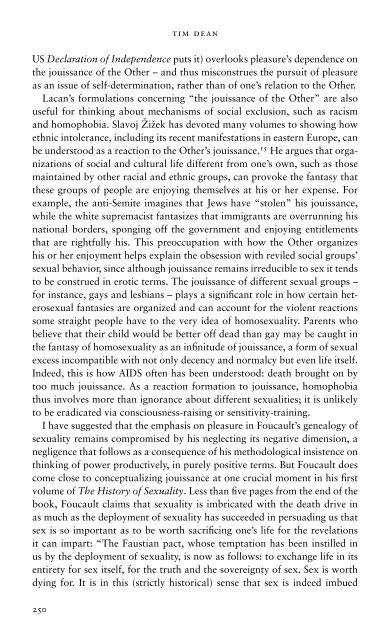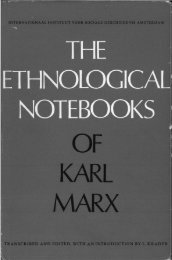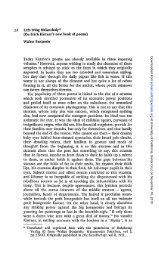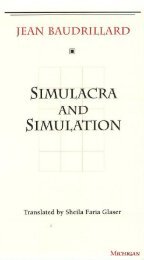X8JKsF
X8JKsF
X8JKsF
You also want an ePaper? Increase the reach of your titles
YUMPU automatically turns print PDFs into web optimized ePapers that Google loves.
tim dean<br />
US Declaration of Independence puts it) overlooks pleasure’s dependence on<br />
the jouissance of the Other – and thus misconstrues the pursuit of pleasure<br />
as an issue of self-determination, rather than of one’s relation to the Other.<br />
Lacan’s formulations concerning “the jouissance of the Other” are also<br />
useful for thinking about mechanisms of social exclusion, such as racism<br />
and homophobia. Slavoj ˇ Ziˇzek has devoted many volumes to showing how<br />
ethnic intolerance, including its recent manifestations in eastern Europe, can<br />
be understood as a reaction to the Other’s jouissance. 15 He argues that organizations<br />
of social and cultural life different from one’s own, such as those<br />
maintained by other racial and ethnic groups, can provoke the fantasy that<br />
these groups of people are enjoying themselves at his or her expense. For<br />
example, the anti-Semite imagines that Jews have “stolen” his jouissance,<br />
while the white supremacist fantasizes that immigrants are overrunning his<br />
national borders, sponging off the government and enjoying entitlements<br />
that are rightfully his. This preoccupation with how the Other organizes<br />
his or her enjoyment helps explain the obsession with reviled social groups’<br />
sexual behavior, since although jouissance remains irreducible to sex it tends<br />
to be construed in erotic terms. The jouissance of different sexual groups –<br />
for instance, gays and lesbians – plays a significant role in how certain heterosexual<br />
fantasies are organized and can account for the violent reactions<br />
some straight people have to the very idea of homosexuality. Parents who<br />
believe that their child would be better off dead than gay may be caught in<br />
the fantasy of homosexuality as an infinitude of jouissance, a form of sexual<br />
excess incompatible with not only decency and normalcy but even life itself.<br />
Indeed, this is how AIDS often has been understood: death brought on by<br />
too much jouissance. As a reaction formation to jouissance, homophobia<br />
thus involves more than ignorance about different sexualities; it is unlikely<br />
to be eradicated via consciousness-raising or sensitivity-training.<br />
I have suggested that the emphasis on pleasure in Foucault’s genealogy of<br />
sexuality remains compromised by his neglecting its negative dimension, a<br />
negligence that follows as a consequence of his methodological insistence on<br />
thinking of power productively, in purely positive terms. But Foucault does<br />
come close to conceptualizing jouissance at one crucial moment in his first<br />
volume of The History of Sexuality. Less than five pages from the end of the<br />
book, Foucault claims that sexuality is imbricated with the death drive in<br />
as much as the deployment of sexuality has succeeded in persuading us that<br />
sex is so important as to be worth sacrificing one’s life for the revelations<br />
it can impart: “The Faustian pact, whose temptation has been instilled in<br />
us by the deployment of sexuality, is now as follows: to exchange life in its<br />
entirety for sex itself, for the truth and the sovereignty of sex. Sex is worth<br />
dying for. It is in this (strictly historical) sense that sex is indeed imbued<br />
250







